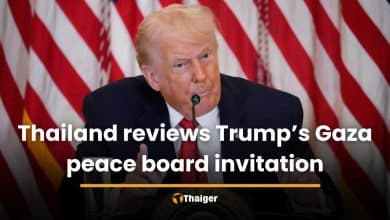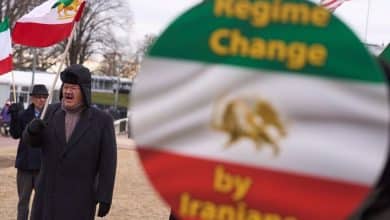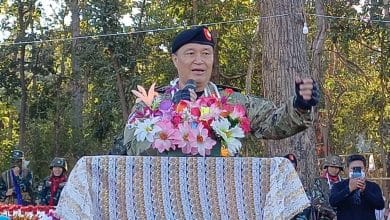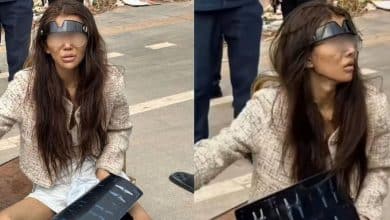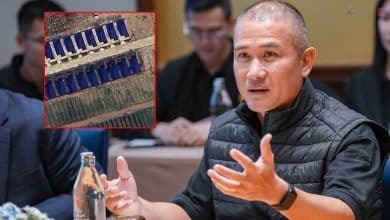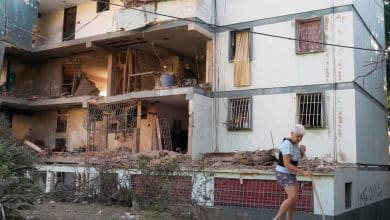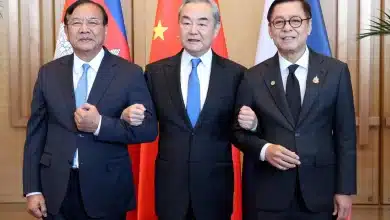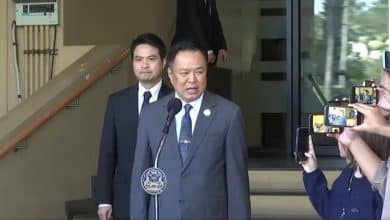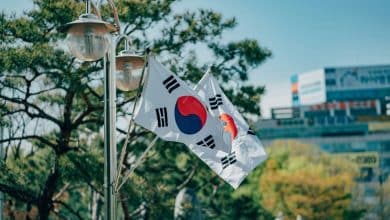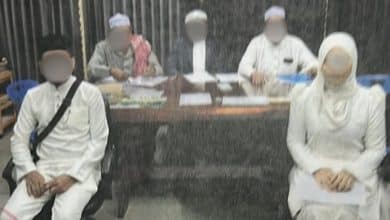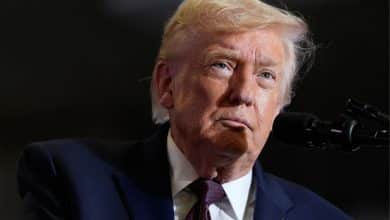World News
World news, global politics, business, technology, and culture—stay updated with breaking stories, international trends, and major events. Get the latest from The Thaiger, your trusted source for global news.
-

Many Thai workers in Middle East choose to stay on despite escalating conflict
Many Thai workers in the Middle East said they do not want to return to Thailand despite the escalating conflict involving Iran and a US-Israel military coalition, with Thai residents posting updates on social media. Thai people living and working in the region, particularly in Israel and the United Arab Emirates (UAE), shared photos and videos of themselves running to…
-

Thailand to offer travel deals to tourists affected by Middle East flight cancellations
Thailand’s Ministry of Tourism and Sports is seeking cooperation from the private sector to offer special travel packages for foreign tourists affected by Middle East flight cancellations. The Tourism Authority of Thailand (TAT) has set up a Tourism Crisis Monitoring Centre to closely track the escalating situation in the Middle East and provide information to travellers impacted by the disruption.…
-

South Korea visa-free trial launched for Indonesian group tourists
South Korea launched a visa-free trial scheme for Indonesian tourists travelling in organised groups, as part of its broader effort to attract 30 million foreign visitors annually. The South Korean government unveiled a new campaign titled “Visit Korea Year” during the 11th National Tourism Strategy Meeting, held under the theme “K-Tourism, Embracing the World: A Great Transformation of Inbound Tourism,…
-

Blind Myanmar refugee found dead after police drop-off in New York
A blind Myanmar refugee and father of two was found dead on February 24 in Buffalo, New York, after being released from custody and later left at a Tim Hortons coffee shop, prompting calls for a full investigation in the United States. The deceased was identified as Nurul Amin Shah Alam, who had fled Myanmar and entered the United States…
-

Suvarnabhumi Airport apologises after complaint about rude staff and poor service
Suvarnabhumi International Airport issued an apology after Thai travel bloggers and other passengers complained about rude behaviour and poor customer service at a security screening checkpoint. Several travel bloggers posted in recent days about negative experiences at security and passenger screening points at Thai airports, particularly Suvarnabhumi. Many said officers spoke to passengers without manners and showed little service-mindedness. The…
-

New passenger screening procedures eyed for Thai airports
Airport workers in Thailand reportedly raised concerns after the Civil Aviation Authority of Thailand (CAAT) planned to change passenger screening procedures, moving away from handheld metal detectors to manual searches and searches of suspicious bags without prior notice to passengers. DailyNews reported today, February 23, that CAAT introduced new rules for screening passengers and their belongings. However, the CAAT had…
-

Sydney hammer attack leaves South Korean man and 2 Thais injured
A South Korean man and two Thai nationals were injured in a hammer attack in Sydney, Australia, on February 18, after they were assaulted by three people while walking home from a party. The incident occurred at about 3am as the 23 year old South Korean man, identified as Dave, walked with two Thai friends aged 28 and 29. Reports…
-

Thai masseuse in Germany sued for providing ‘special service’ without consent
A Thai masseuse in Germany has to pay €1,000 in compensation to a male client after she sexually assaulted him by providing “special services” without consent. The complainant, a 26 year old German software engineer, identified only as Ben, reported the sexual assault to police two days after it occurred at a massage shop on Osloer Straße in Berlin. The…
-

AOT to raise passenger service charge for international flights from May
Airports of Thailand (AOT) confirmed plans to increase the passenger service charge (PSC) for international departures in May this year. While the increase will largely affect foreign travellers, AOT insisted that it will not reduce the number of international visitors to Thailand. The chief executive officer of AOT, Paweena Jariyathitipong, told local media that the PSC for passengers departing on international…
-

AirAsia leaves 23 passengers behind on bus, cites miscommunication
AirAsia issued an apology following a coordination issue that left 23 passengers on a shuttle bus during boarding for a domestic flight from Bangkok to Hat Yai. The incident occurred on January 17 on Flight FD3116, which was scheduled to depart Don Mueang International Airport at 7.10am. A passenger later described the situation in a Facebook post published on January…
-

Cobra Gold 2026 brings over 8,000 troops to Thailand
Thailand is set to host the 45th annual Cobra Gold military exercise from February 24 to March 6, bringing together more than 8,000 personnel from 30 countries in one of the region’s largest joint defence operations. The multinational exercise, co-hosted by the Royal Thai Armed Forces and the United States Indo-Pacific Command (US PACOM), will take place across several locations…
-

Thailand considers invitation to join US-led Gaza peace board
Thailand is reviewing an invitation from US President Donald Trump to join a proposed international ‘Board of Peace’ aimed at resolving the conflict in Gaza, according to the Ministry of Foreign Affairs today, January 19. The initiative, part of Trump’s proposed Comprehensive Plan to End the Gaza Conflict, outlines the creation of a peace board initially focused on Gaza, with…
-

Thailand among 75 nations hit by US visa processing suspension
The United States will temporarily suspend immigrant visa processing for Thailand and 74 other countries, effective January 21, 2026, as part of tighter immigration screening under its America First policy, the US State Department announced on January 14. The immigration visa freeze targets applicants from countries where migrants are said to disproportionately rely on public assistance after settling in the…
-

What’s happening in Iran? How hunger protests turned into a fight to topple the Islamic Republic.
Iran is currently cut off from the outside world. The government has severed internet and telephone lines nationwide, hoping to blind and deafen the international community to the brutality of its crackdown. Yet, the screams of frustration from the streets echo far beyond the digital blackout. This nationwide uprising is a clear signal: the 40-year-old theocratic regime is facing its…
-

Thai students claim top prize at Harbin snow sculpture contest
Thai vocational students from Bangkok and Chiang Rai won the 2026 International Collegiate Snow Sculpture Contest in Harbin, China, with a sculpture inspired by the Siamese fighting fish and goddess of water. The annual snow sculpture contest, organised by Harbin Engineering University, returned for its 18th edition this year. The competition was held from January 4 to 7 in Harbin,…
-

New ‘Republic of Kawthoolei’ announced at Thai-Myanmar border
The son of a former leader of the Karen National Union (KNU) declared independence and announced the establishment of the Republic of Kawthoolei, a self-proclaimed state located along the Thai–Myanmar border. Nerdah Mya, the son of former KNU leader Bo Mya, introduced himself as the first president of the Republic of Kawthoolei, meaning “the land without darkness” in Karen, on…
-

Missing Chinese influencer found injured and begging in Cambodia
A Chinese influencer was found injured and begging for money in Cambodia after losing contact with her family since December 26 last year. Images of a Chinese woman carrying an X-ray film circulated widely on Cambodian and Thai social media recently. The woman was seen wearing a white mini dress with a tweed blazer, glasses, and a headband worn across…
-

New fraud center compound found in Cambodia, 50 km from Poipet
Authorities have identified a new large-scale scam compound operating in Cambodia, around 50 kilometres from Poipet, raising fresh concerns over the regional spread of online fraud networks targeting victims worldwide. The Anti-Online Fraud Center, known as ACSC, confirmed the discovery on January 5, 2026, warning that criminal syndicates are rapidly relocating and expanding after recent coordinated crackdowns in Thailand, China,…
-

Thailand calls for restraint amid US-Venezuela tensions
Thailand’s Ministry of Foreign Affairs yesterday, January 4, issued a statement calling for restraint amid escalating tensions between the United States and Venezuela. The US launched a military strike across northern Venezuela on Saturday, January 3, under an operation named Operation Absolute Resolve. During the raid, Venezuelan President Nicolás Maduro and his wife, Cilia Flores, were captured following allegations that…
-

Explosion at Swiss Bar in Crans-Montana Kills at Least 40
Swiss Ski Resort Tragedy Explosion at Crans-Montana Bar Kills ‘Dozens,’ Italy Reports 40 Dead CRANS-MONTANA — A devastating explosion followed by a massive fire at a popular bar in the renowned Swiss ski resort of Crans-Montana has resulted in a “mass casualty” event, sending shockwaves across Europe. Swiss police confirmed “dozens” of fatalities, while Italian authorities report the death toll…
-

“I Paid For It!” Chinese guest fumes after being stopped from packing buffet food
Mother and Son Cause Scene at Hotel Buffet Over ‘No Takeaway’ Ban, Threaten Staff SUZHOU — A heated altercation erupted at a hotel in Suzhou, Jiangsu Province, after a mother and son were stopped from packing food from the breakfast buffet to take home. it escalated into a physical confrontation after the guests refused to comply with hotel regulations. Witnesses…
-

Body of Missing 19-Year-Old Texas Teen Found After Christmas Eve Disappearance
Tragic End: Body of Missing 19-Year-Old Texas Teen Found After Christmas Eve Disappearance SAN ANTONIO, TEXAS — The desperate search for Camila Mendoza Olmos, 19, who vanished on Christmas Eve, has concluded with a heartbreaking discovery. Bexar County Sheriff Javier Salazar confirmed on Tuesday afternoon that search teams located a lifeless body in a field near the residential area where…
-

Thai and Cambodian diplomats meet in China to reinforce ceasefire and border stability
Top diplomats from Thailand and Cambodia met in China on Sunday for high-level talks aimed at reinforcing a fragile ceasefire and preventing a return to fighting along their disputed border, as Beijing steps up its role as a regional mediator. The meetings follow the signing of a new ceasefire agreement intended to halt weeks of clashes that have killed more…
-

Thailand agrees to ceasefire, rejects pre-clash position return
Thailand says it is prepared to enter a short ceasefire with Cambodia but will not accept any deal that requires Thai forces to retreat from areas they have secured during the latest border clashes. Prime Minister Anutin Charnvirakul said the National Security Council has approved a 72-hour ceasefire proposal and authorized Defense Minister Nattaphon Narkphanit to represent Thailand at talks…
-

Thai army reports heavy clashes in Sisaket as border tensions stay high
The 2nd Army Region has released its latest summary of fighting along the Thai-Cambodian border, saying tensions remained high on December 26, particularly in Sisaket province, where heavy exchanges of fire were reported throughout the day. According to the army, clashes were concentrated across multiple points along the border, but Thai forces retained control of all strategic areas. In Ubon…
-

Cambodian men charged over attack on Thais in South Korea
Four Cambodian men were arrested today, December 26, and charged in South Korea after allegedly attacking two Thai nationals with glass bottles on the morning of December 7 in Yeongam county, South Jeolla province. The assault took place on the morning of December 7 in the Samho-eup area of Yeongam county, South Jeolla province, when a group of four Cambodian…
-

Thai tutor confronts foreign man shouting ‘Ni Hao’ and urges others to speak up
A Thai English-language tutor and social media influencer shared her experience of confronting a foreign man who shouted “Ni Hao” at her, urging others not to stay silent when faced with similar behaviour. The influencer, Warinthorn “Ann” Euawasinthon, widely known as Kru P’Ann, is the founder of Learnovate and a popular online educator. She has more than 1.7 million followers…
-

Malaysian woman allegedly lives double life after secret marriage in Songkhla
A Malaysian woman called on religious authorities to take action after discovering that her brother’s wife had secretly married another man in Songkhla province of Thailand and lived a double life for more than a year. The woman, identified as Ekin Derahim, shared details of the alleged affair on her Facebook account on December 11. In her post, she also…
-

Trump reclassifies cannabis in major US drug policy shift
US President Donald Trump has ordered a change to federal drug regulations, signing an executive order to downgrade cannabis from a Schedule I to a Schedule III narcotic, the most significant shift in American drug policy in decades. The reclassification would place cannabis in the same category as ketamine, anabolic steroids, and Tylenol with codeine, substances considered to have legitimate…
Broke? Find employment in Southeast Asia with JobCute Thailand and SmartJob Indonesia. Rich? Invest in real estate across Asia with FazWaz Property Group or get out on a yacht anywhere with Boatcrowd. Even book medical procedures worldwide with MyMediTravel, all powered by DB Ventures.











